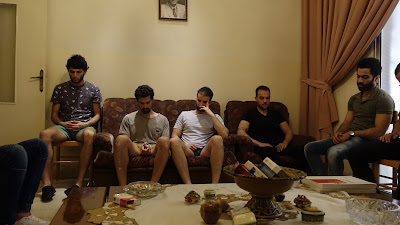It is difficult to imagine, after viewing MARTYR -- the new movie from Lebanese filmmaker Mazen Khaled -- that the film was not hugely divisive, both in its home country of Lebanon and elsewhere. This is one of the most homoerotic movies I have ever seen, while remaining just this side of anything obviously/overtly homosexual. There are good reasons for this particular artistic stance. Writer/ director Khaled (shown below) is exploring a Muslim society in which the
highly religious adhere to a strict code that, by not allowing nearly as much interplay between male and female as does most of western society, pushes young men together into kinds of "closeness" that cannot help but move from mental, physical and spiritual into the sexual, especially when some of these men are, of course, already genetically programmed to want and need the kind of love from each other that can best be expressed sexually.
Further, while fostering homoeroticism, the restrictive nature of the Muslim religion allows for less privacy. The movie's "hero," Hassane (played with fraught intensity by a beautiful newcomer, Hamza Mekdad, below, being carried), can't even masturbate in peace while taking a shower -- thanks to his parents' constant badgering.
Khaled's film is a fantasia of visuals and themes -- imagined and real, on land and sea, impressionistic, grounded, emotional, some of these even danced and sung -- about attraction, love, employment, economics, death and grief, all sifted through the sieve of the kind of fundamentalist religion that controls all.
Instead of looking for work (or simply showing up at the jobs some of them already have), Hassane and his pals take a day off at the beach, above, where the popular sport is to take a somewhat dangerous dive or jump (below) from a favored point above the water. One particular dive changes everything, and from there the movie fills with questioning and grief, as the group begins to pine for what might have been.
Characters explore the thoughts and feelings they are unable or unwilling to vent in their actual life -- via dance (below, in the closest thing to something homosexual the movie offers) and choral keening (from Hassane's mother and her peers), even as the movie continues its immense and near-constant fascination with the human body, skin and touch.
Moving from documentary-like footage to philosophical inquiry to religious ritual to the question of what the title term actually means, Martyr balances the formal with the elliptical, finally arriving full circle back to the sea -- and the skin.
Don't expect something at all standard here, but if you approach the film in anything like the spirit in which it was conceived and executed, I think you will find yourself enmeshed and enraptured by its beauty, while saddened at the picture of male youth wasted and/or sacrificed to tradition and religion.
From Breaking Glass Pictures and running 84 minutes, the movie opens this Friday, November 30 in Los Angeles at Laemmle's Glendale and then on Friday, December 14 in New York City at the Cinema Village. In between times, on Tuesday, December 4, Martyr will have its release on DVD and VOD (the latter via iTunes, Amazon Prime Video, Google Play, Vudu and FandangoNOW).



















































